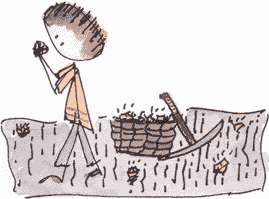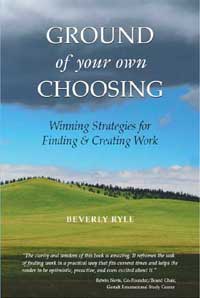 We’ve become accustomed to hearing the story of a professional life told almost exclusively in terms of outstanding accomplishments.
We’ve become accustomed to hearing the story of a professional life told almost exclusively in terms of outstanding accomplishments.
Ask an athlete to reflect on his career and he’ll tell you about the time he pitched a no-hitter. Ask an actress and she’ll talk about landing the lead in a Tony-winning Broadway play. Ask a writer and he’ll recall how it was his third novel that lifted him from obscurity and made him a best-selling author.
These public, universally acknowledged achievements, which everyone recognizes as peak moments, are what we’ve come to expect when someone looks back on their life.
The stories you have written embody the skills you most enjoy using.
But what about the rest of us—those of us who’ve never won a Cy Young or an Oscar or a National Book Award? What are our peak moments? Do we even have them? Of course, we do. Everybody does.
They may be public and universally recognized or they may not be, but even if they’re not, it doesn’t mean they’re any less important to us (or to the world, for that matter).
In fact, it’s often true that the less world-shaking the experience, the more valuable it is on a personal level. It’s not at all unusual to hear some highly successful person speak of finding more satisfaction in a small task done well than in the great achievements he or she is celebrated for.
What exactly is a peak moment? It’s simply a time when you felt a deep sense of accomplishment and personal fulfillment over your part in a particular event or happening. It’s a moment when you felt fully alive and completely enjoyed being who you are. It may be something that the world knows about and applauds you for. Or it may be your own personal secret. It doesn’t matter. Recognition, or the lack of it, is fundamentally irrelevant. What’s important is the sense of personal fulfillment.
Most people don’t spend a lot of time thinking about their professional accomplishments until they’re faced with the task of preparing a resume. In a sense, a resume is a collection of peak moments, but only of the kind that the world recognizes as peak moments.
Too often the things that provide the greatest satisfaction on a personal level are not the sorts of things that can be included in a resume. You can say that you successfully negotiated a million dollar contract or implemented a just-in-time inventory system that saved the company $300,000 a year, but you can’t say that you cared for a dying parent or mentored a troubled teenager through to graduation or helped to set up a neighborhood watch program.
In the single-minded pursuit of "the job" through the painstaking perfection of a resume, we can easily lose sight of the richness of the narrative of our career autobiography (see last month’s issue for more on this subject) and the pivotal content of its most meaningful events.
When we identify, write down, and tell the stories of our peak moments, the things we’ve done which have given us the greatest personal satisfaction, we are "mining" our career history for those skills which we most enjoy using.
When we dig deeper into old shafts that seem played out or open up new ones, we discover these skills like precious gems and when we have found them we put them into our packs for later use.
This is how we amass the hidden treasure that is there to be discovered in our professional life—aligning who we are with what we do, and eliminating any conflict between the two. Taking a closer look at those occasions when we put forth our best efforts measured purely by our own standards is the foundation upon which we can build a more satisfying professional life.
GUIDELINES FOR SKILLS STORIES
Step One: List "peak moments"
Think back over your life and try to remember anything you did which was meaningful to you in a personal way. Use what Richard Bolles calls a "memory net": review your history in terms of places you lived, schools you attended, jobs you held, etc.; some people find it helpful to proceed a decade at a time. Use whatever approach seems most natural to you. The goal is to be as thorough as possible.
Step Two: Choose topics
From your collection of peak moments select 6 to 10 to write about that speak to achieving a goal or overcoming an obstacle of some kind. This can, and should, include everything from selling magazines door-to-door at the age of ten to winning Salesperson of the Year. The topics you choose should represent the full spectrum of your life (i.e., don’t focus just on your childhood or your education or your career). Try to select at least one topic from your pre-career days and at least one that represents something you feel you’ve lost track of along the way.
Step Three: Write out each topic in narrative form, as a story
Tell what happened, your part in making it happen, how the outcome affected you and others, and why the accomplishment is still meaningful to you. Focus on content, saying what you need to say, rather than form, how well you feel you are expressing yourself. This is not a literary exercise but a mining expedition, and the goal is self discovery, not polished prose. Most people can tell a story in a page to a page and a half. If you need more space you may be trying to tell more than one.
Step Four: "Mine" each story for hidden skills
The stories you have written embody the skills you most enjoy using. Now you need to identify and name those skills. To do this, reread your stories looking for evidence of the skills you used to accomplish the goal or overcome the obstacle. Then share your stories with at least two other people and ask them to identify the skills they see there. Often their list will reveal skills that come so naturally to you that you never think of them. As you continue your storytelling and "skill-collecting" you will find that the same ones come up again and again. These repeated patterns point to the skills syou most enjoy using, the "mother lode" of genuine wealth you’re after.
Authors note: I am indebted to Dick Bolles, author of What Color is your Parachute? for both the story-writing exercise and the rich personal experience of hearing his own stories and sharing mine during a workshop of his I attended some years ago. His work and spirit continue to serve as a strong foundation for the Center’s mission.







